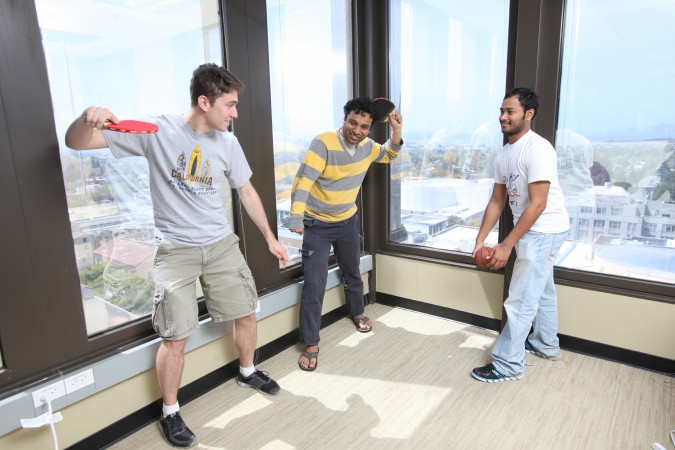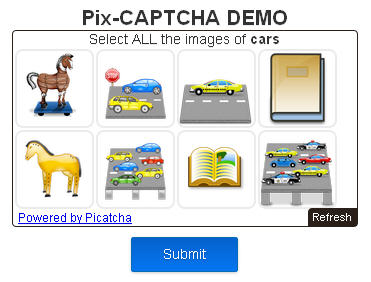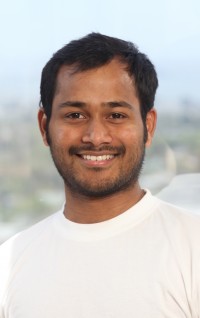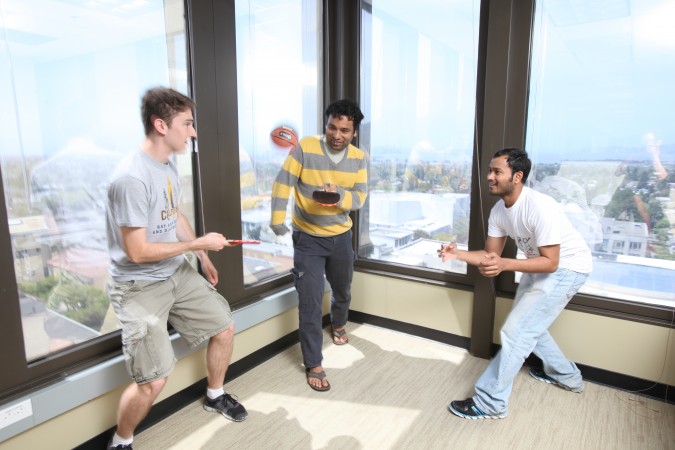Archive for the ‘Sean Carey’ tag
I meet the Picatcha.com team at the University of California Berkeley Skydeck startup accelerator

Picatcha.com team playing ping pong with a basketball. May 2, 2012, at University of California Berkeley Skydeck startup accelerator. Photograph by Kevin Warnock.
On May 2, 2012 I met with Satish Polisetti, Dhawal Mujumdar and Sean Carey of Picatcha.
Picatcha is a made up word combining ‘picture’ and ‘Captcha.’
Captcha stands for Computer Automated Public Turing Test to tell Computers and Humans Apart. Captchas were invented by researchers at Carnegie Mellon University.
Even if you don’t recognize the word captcha, you know the test. Here’s an example of Captcha used by Facebook [where I encourage you to subscribe to my posts]:
This Captcha was posted to the photo sharing site Flickr because the first word is difficult to read. You can see Flickr user Chance Abbatoir couldn’t make out the word and wrote wtf? in its place. Wtf is short for ‘what the fuck’ for my readers who aren’t familiar with this slang term.
This illustrates the problem Picatcha is trying to solve.
Regular Captchas similar to the example from Facebook here are too easy for computers to figure out. That allows bad guys to do things they should not do, like buy hot concert tickets as soon as they go on sale, bumping out actual people by overwhelming the websites where the tickets are sold, such as at TicketMaster and Live Nation. The ticket sites assume the buyers are legitimate because the Captchas are correctly deciphered. As a result, more concert goers have to buy their tickets at inflated prices on the secondary market.
In response to such fraud against web properties, traditional Captchas are getting more difficult for humans to solve, such as the one shown here from Facebook. I suspect it says ‘N 1/4’ but I can’t be certain. Can you?
Computers and software are improving. There’s an arms race between conventional Captcha writers and the bad guys. The bad guys are winning.
Picatcha has a different approach.
Picatcha presents a challenge that’s currently difficult for a computer to solve.
The Picatcha twist is that users are asked to look at a set of images and identify the subset that matches a word. For example:
In this example the user has to click on the two middle pictures on the top row, and the second and last picture on the second row. Teaching a computer how to solve this puzzle is much harder than training optical character recognition software to decipher regular Captchas, according to Picatcha. Think about it from the computer’s perspective… the Picatcha way requires machine vision to identify arbitrary objects. OCR only has to deal with 26 letters and 10 digits. A computer trained to break Picatchas would have to handle a vast array of images, which could be crude line drawings up to detailed color photographs.
Picatcha does a lot of other things that make it more compelling than what I’ve so far described.
They allow customers to use images of their products in their picture captchas. Imagine how this would thrill consumer product companies. Imagine how personal this makes the test for users. Suddenly the access tests can become fun, not irritating.
You solve Picatchas by clicking or touching, not typing, making them much more friendly to solve from smart phones and tablets.
There’s extra tricky security happening under the covers, I was told, so this is not a quick programming project to duplicate.
Even more compelling is the Picatcha system can vary the images depending on who the user is. That’s right, the system can tap into your location and demographic data that Picatcha has access to via commercial ad serving services. This strikes me as a brilliant way to enhance user satisfaction and make it more likely they’ll sign up for or buy whatever is behind the Picatcha.
I am impressed with Picatcha. So were the semi-final round judges for the 2011 University of California Berkeley Business Plan Competition, hosted by The Lester Center for Entrepreneurship & Innovation and led by Executive Director André Marquis. Picatcha competed in that competition in 2011 and advanced to the elite final group of eight teams [Note to the Berkeley Business Plan Competition organizers: Keep these links valid in perpetuity. Right now it appears only two years of winners are identified at your site. All winners and finalists back to the 1999 inception of the competition should be listed. Thank you.]. Picatcha collected a cash prize for their efforts. It’s very, very difficult to advance to the finals in that competition… I know as I was a semi-final round judge in that competition. I was not a judge for Picatcha, as I served on the Products & Services track, and Picatcha competed on the Information Technology & Web track. I did not meet the Picatcha team last year at the finals, as I was not yet a tech blogger.
Picatcha started as a school project for Co-Founders Mujumdar and Polisetti when they were students at the School of Information at University of California, Berkeley. They described their work in an attractive summary report. Their Advisor was Bob Glushko.
Picatcha is a hosted service, so its customers don’t need to install any software on their web servers. According to the front page of the Picatcha website today, the company has served up over four million access tests so far, on over 200 customer websites.
When I was meeting with Co-Founder Dhawal Mujumdar last week, he showed me the Picatcha implementation for a brand so famous you are all but certain to have heard of it if you live where their product is sold — M & Ms, the chocolate candy from Mars that melts in your mouth, not on your hands.
Picatcha is sharing office space with other impressive startups at Skydeck, the startup accelerator at University of California at Berkeley, in Berkeley, California USA. I met the Picatcha team after I informed Eliot Sun from Kloudless, Inc. that I’d like him to introduce me to another team, as I had time before my next meeting, and I wanted to be productive. I’ve wrote about Kloudless yesterday, May 7, 2012. I took the pictures for this post. Click on them to see them at full 21 megapixel resolution. There are many more good shots of the Picatcha team playing basketball ping pong in a public album on my Facebook page.






